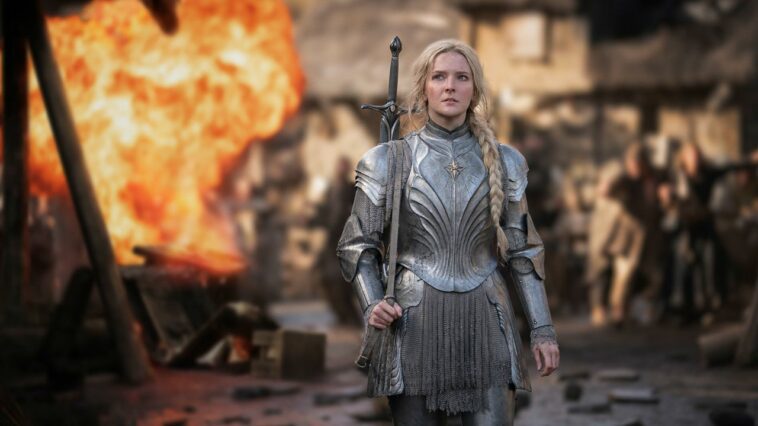The following contains spoilers for The Lord of the Rings: The Rings of Power S1E4, “The Great Wave” (written by Stephany Folsom and J. D. Payne & Patrick McKay, and directed by Wayne Che Yip), S1E5, “Partings” (written by Justin Doble, and directed by Wayne Che Yip), and S1E6, “Udûn” (written by Nicholas Adams & Justin Doble and J.D. Payne & Patrick McKay, and directed by Charlotte Brändström)
The Lord of the Rings: The Rings of Power S1E6, “Udûn,” finally hit the climax of the season, as Galadriel and Arondir’s storylines seemingly converge and result in the formation of Mt. Doom. After a really strong start, the series spent most of the middle of the season circling the wheel, seeming unsure of where it wanted to go, despite the outcome being pre-ordained by the fact that the show is a prequel, and by its very name. The series has been gorgeously designed and shot, with Charlotte Brändström doing a particularly standout job on S1E6, but the plotlines have had a tendency to lag, with the characters making seemingly inexplicable decisions and reversals within moments. But, especially with the way “Udûn” ends, it seems the show is finally ready to show its cards.
The problem of prequels is that the audience knows where things are ultimately going—though in the case of The Rings of Power the fact that the other story is thousands of years in the future means it should be less constraining. Instead, the middle episodes of the show have felt extremely limited. The Stranger is still an unknown figure. The goals of the Numenorians are confusing and ill-paced. And Halbrand is definitely Sauron but the show doesn’t want to admit that yet. (I guess I could be wrong, but after S1E6 I don’t see how that is remotely possible.)
The show has teased some fascinating dynamics with several characters, especially Galadriel (Mordydd Clark). Galadriel is on a journey that could make something really interesting and thought-provoking. We may know that she won’t turn completely to darkness, but she doesn’t know that. Her struggles are really great moments for Clark to play as well and she has been extremely compelling and charismatic as a character and an actress. Which makes it frustrating when she suddenly is supposed to embody goodness and light, or she starts to moralize in a non-ironic way.
Give me more scenes like those near the end of The Rings of Power S1E6 with the fallen elf Adar (Joseph Mawle) pushing Galadriel to her breaking point and Halbrand smoldering at her as she becomes more and more violent. Especially since Mawle is delightfully evil but also sad and interesting in his portrayal, and as Adar’s importance to the story gets clearer. But most compellingly, Charlie Vickers and Clark have an electric chemistry that makes some of their scenes feel more like they are Targaryen relatives than Tolkein characters.
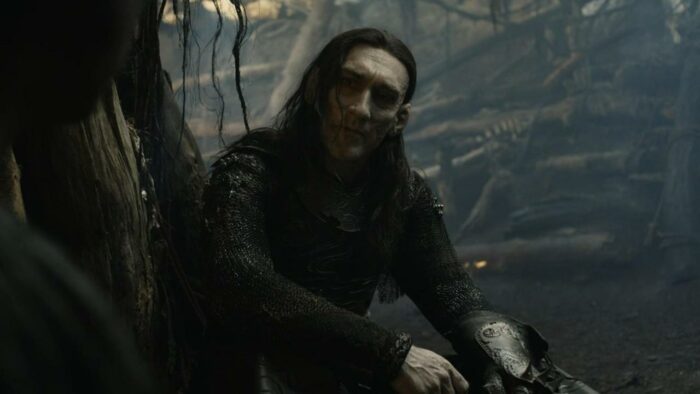
The Rings of Power has also set up several other storylines where the very nature of the characters seems to be in question. Is Nori’s thirst for adventure actually dangerous to the Harfoots? Is the Stranger a dark force or simply the unbound force of magic in the world? Would the Numenorians be better served not going blindly into war? Is Adar right that the Orcs, the Uruk, were also created by the god of the world and thus deserve someone to fight on their behalf?
The fact that in the end, The Rings of Power is destined to be a tale of descent into darkness also adds nuance to these questions. When Galadriel berates Adar and vows that she will kill every single orc and make him watch, you can see the dark power and pain in her eyes, and Adar rightly tells her that makes her no better than him. But it is unclear that the show has any interest in committing to this exploration of the character. Really the show seems to loathe the idea of committing to much of anything. The episodes have developed a consistent, infuriating, habit of having characters make a decision only to change their minds, often without a compelling reason, mere moments later.
The worst offenders in this are the Numenorians. In S1E5, the MirielQueen Regent (Cynthia Addai-Robinson) decides that she should help Galadriel, in part because it is what her father always wanted. But moments later, her father the king gives her a cryptic message that if she does help fight in Middle Earth, Numenor is doomed. Her sneaky advisor Chancellor Pharazon (Trystan Gravelle) is no better, he had been set up in opposition to Galadriel from the start—and clearly will be again later—but, as he explains to his son Kemen (Leon Wadham), he wants to take political spoils from waging war in the Southlands. Despite that being Pharazon’s plan he then somehow changes his mind after his dimwit son blows up the two ships and once again starts arguing that they shouldn’t go. Some of the shifts make sense in the moment, particularly since Gravelle is a really captivating performer, but having them happen over and over has been pretty maddening.
This is especially true when it comes to Bronwyn and Arondir’s misadventures in the Southlands. Bronwyn (Nazanin Boniadi) has been a natural leader, but the show doesn’t seem ready to commit to showing people follow her. Instead, she sometimes seems capable and in charge but at other times people, especially her son Theo (Tyroe Muhafadin) seems to refuse to listen to reason at all. This led to a predictable mutiny from half the population, but once again the pacing was just weird. Bronwyn convinces everyone to fight against the orcs and in the same scene, half of the same people decide to leave. Arondir (Ismael Cruz-Cordova) winds up escaping his captivity and saving Theo, with a really sweet reunion with Bronwyn—by the end of The Rings of Power S1E6 they even get to kiss, which feels like a full-on sex scene in this world. But even his motivations seem muddied.
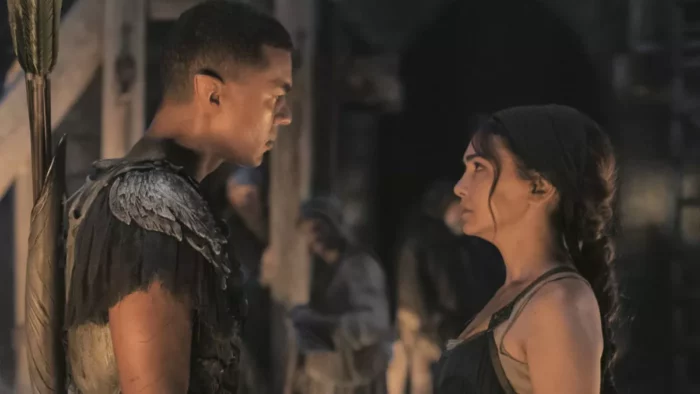
There have been some really bad faith critiques of The Rings of Power, but these basic storytelling missteps are not among them. J.D. Payne and Patrick McKay have a great sense of the Tolkein lore and where they want the characters to go but, at least in these middle episodes, it seems that they have some difficulty crafting small plot beats to get them there. In addition to the issue of people turning on a dime within scenes, everyone also seems to take things as a given that definitely should not be accepted out of hand.
Why does everyone think Halbrand should be the king? Why do Galadriel and the Queen Regent even want the old king of the southland back? Even if Halbrand isn’t Sauron, there doesn’t seem to be any reason for the people to actually rally behind him. It isn’t even like it was with Aragorn who was both rumored to be the rightful king and also, ultimately, wielded the sword that proved his worth. Halbrand is just a very charming, but creepy, almost literal dirtbag, who likes to flirt with Galadriel (as one should) and give knowing winks to the camera.
The thing that would make the character much more interesting though is if, again assuming he is Sauron in disguise, Adar is right and he is not just in disguise but actively trying to change. If this was all a ploy to get back to the Southlands and enact a masterplan to ignite Mt. Doom, then it isn’t ever interesting. But creating a sense of danger and ambiguity around every character and every choice is what the show does best. If Sauron has really, as Adar says—though Adar is clearly an unreliable narrator—been trying to escape from his past and actually repair some of the damage he has done, if he is actually repentant and trying to be good, then there is a story to be told in how and why he can’t do it. Halbrand being reluctant to return to the Southlands and not wanting to be made King is tied to that. If the power is calling to him and he is trying to refuse it, he knows that temptation will be too strong if he embraces it. But he can’t stop following around the gorgeous elf lady long enough to get away from it.
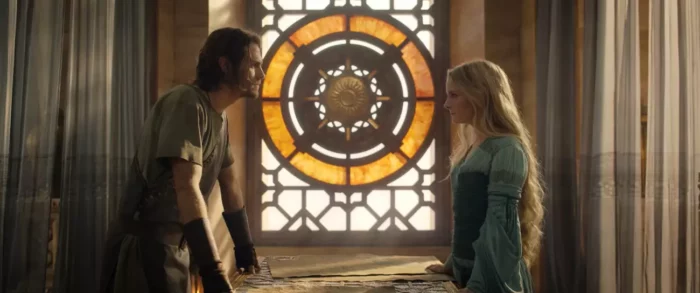
This is also a dynamic at play with Nori and the Stranger (the deeper questions, not the flirtation, thankfully). Nori (Markellah Kavenagh) is a character the audience is inclined to like and root for. Her playfulness and bristling at the sometimes ludicrous rules of her people are the exact traits that draw people to the central characters in these types of fantasy stories. And she sees the arrival of the Stranger as her call to adventure—as Gandalf’s arrival will be for both Bilbo and Frodo, which we clearly should still remember. But the Stranger (Daniel Weyman) is either a dark force or if he isn’t evil (and I don’t think he is) he is still dangerous and powerful, and unable to control his magic. This makes their bond and friendship, and Nori’s quest to get him to his goal, much more difficult to parse. We want to root for them, but there are also some clearly evil-looking priest figures who want the Stranger to reach those stars too.
Ambiguity, deception, and the limits of friendships and oaths in a world filled with darkness are also the themes of the scenes with Elrond (Robert Armamayo), Durin (Owain Arthur), and Gil-Galad (Benjamin Walker). They all tell each other stories that could be true but definitely are not entirely true—the tale of the origins of Mithril has many Tolkein fans in a huff, I don’t buy the story was even true in-universe, but even if it was… get over yourselves and let people tell a story. Durin makes up a tale about how their table is special to dwarves just to mess with Gil-Galad but it definitely seems that it is Gil-Galad who is playing the two friends to his own ends. Every time we see Gil-Galad the scene ends with an ominous show of Walker staring out into the middle distance, which seems a bad portent.
Durin and Elrond’s friendship and Durin and Disa’s (Sophie Nomvete) marriage are probably the purest and most real aspects of the show. We get to see Disa sing to the mountain both to free trapped miners and also in the original discovery of Mithril, but at every step, she and Durin are a team and have a loving, communicative, relationship. That love and lightness also seem to be the heart of Elrond’s love for Durin. They like and care for each other, which makes Elrond unwilling to break his oath not to tell anyone about the Mithril. Though this whole conflict is muddied by the show’s inconsistent writing, Elrond is torn up over his oath, but as everyone else already knows his secret, it makes the stakes of his decision unclear. But what is clear is the ominous pall hanging over them all. All of this seems quite likely to end badly too.
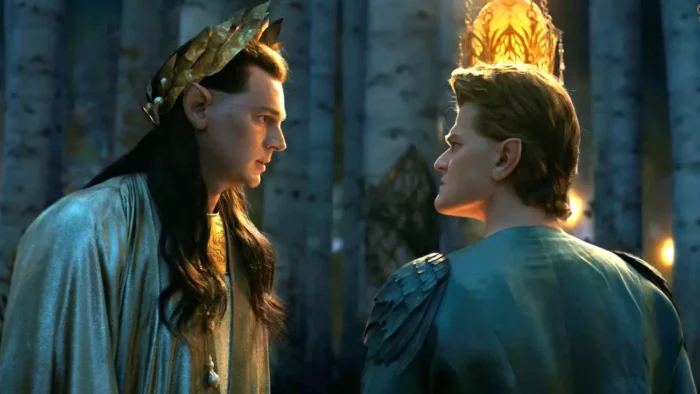
But, at the end of The Rings of Power S1E6, that all falls to the side. The humans of the Southlands seem to be saved, in classic Tolkien fashion, by the last-minute arrival of unexpected friends. Galadriel and the Numenoreans arrive and lay waste to Adar’s troops. Galadriel and Halbrand stop each other from killing Adar, again a reversal that happens too quickly, but at least in this case we understand, Adar is the worst and he was asking for it. But then, somehow Waldreg (Geoff Morell), the obnoxious old man who loves Sauron more than anything, winds up opening the dam and enacting Adar’s plan. Water falls into the fires under a mountain and it erupts. We are left with a desolate scene of death and destruction, with Galadriel standing in the center staring at the mountain in shock and anger. Everything that she had fought to prevent is lost, and the rage on her face is a great way to move forward into the last two episodes of the season.

